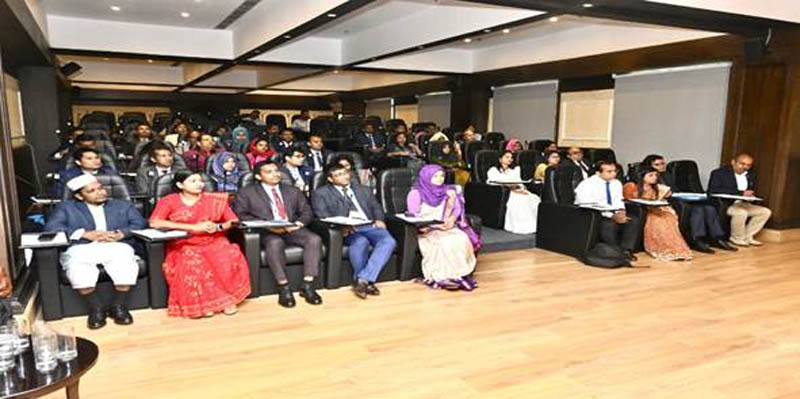 Bangladesh
Bangladesh
NCGG completes training of 60th batch of civil servants of Bangladesh
New Delhi: The 2–week 60th capacity building programme (CBP) for the civil servants of Bangladesh organised by the National Centre for Good Governance (NCGG) in partnership with the Ministry of External Affairs (MEA) concluded on 2nd June, 2023.
Following the completion of the first phase of CBP for 1,500 civil servants, NCGG signed an MoU with the Government of Bangladesh to enhance the capacity of additional 1,800 civil servants by 2025.
Post–Covid 19 pandemic, within the past two years, NCGG has already provided training to 517 officers of Bangladesh.
The 21st century is billed as the 'Asian century'. It offers an opportunity to South Asian countries to transform themselves into developed countries and enhance the quality of life of their citizens.
To achieve this goal, it is important to foster mutual learning and concentrate on citizen-centric public policies and good governance by adopting e-governance.
Under the leadership of Prime Minister Narendra Modi, the Indian government is actively engaged in these endeavours.
It is also helping other developing nations in their endeavour to strengthen the capabilities of their civil servants and technocrats.
In pursuit of this mission, the Ministry of External Affairs (MEA) has identified the National Centre for Good Governance (NCGG) as an ‘institution in focus’. As a result, the NCGG is expanding and scaling up its activities significantly.
The valedictory session of the 60th CBP for civil servants of Bangladesh was chaired by Bharat Lal, Director General, National Centre for Good Governance.
In his address, he highlighted how these capacity building programmes are meticulously curated with the primary objective of facilitating the exchange of knowledge and innovative practices that have been successfully implemented in India to enhance governance and public service delivery.
Through the exchange of best practices, India aims to contribute to the development and strengthening of governance systems globally.
The DG urged the participating officers to identify 4–5 key learnings from the CBP that they can adapt and replicate, with necessary modifications based on their specific needs.
The DG also spoke on the crucial role played by civil servants in society. He urged the civil servants to be sensitive and responsive to the needs of the people and ensure time-bound public service delivery.
By adopting a people-centered approach and focusing on effective problem-solving, civil servants can contribute significantly to the well-being of the public and foster trust in the governance system.
He urged them to work with speed and scale to provide access to basic amenities such as housing, water, toilets, cooking gas, education, healthcare, financial services, and skill development among others.
He underscored that the ‘Asian century’ represents a transformative phase, where South Asian countries must emerge as major global players. With a rich cultural heritage, diverse economies, and a young and dynamic population, South Asia possesses the necessary ingredients for sustainable growth and development.
The DG emphasized the importance of leveraging these strengths to address common challenges, uplift marginalized communities, and improve the lives of citizens in this region.
To expedite the socio-economic development in the Global South, it is imperative to prioritize the inclusion and empowerment of women. By ensuring high-quality public services and creating a favourable environment, women can actively participate in the workforce and engage in meaningful economic activities, thereby enhancing overall productivity.
The DG urged civil servants to work for empowerment of women, guaranteeing equal access to opportunities and resources.
This concerted effort is instrumental in propelling our countries towards the next stage of development, he said.
Furthermore, he emphasized the need for robust measures to prevent leakages and ensure the proper utilization of resources.
Additionally, he highlighted the importance of fostering strong India–Bangladesh relations, emphasizing that this relation should encompass various developmental endeavours.
The DG further urged the officers to actively share their best practices and learnings as part of the NCGG alumni.
This sharing of experiences and expertise can foster innovation, inspire new approaches, and promote positive change in governance and public administration worldwide.
Dr. A. P. Singh, course coordinator in his address highlighted the diversity of topics covered in the 60th capacity building programme.
These initiatives include various aspects of governance, digital transformation, developmental schemes, and sustainable practices.
Among the topics covered is the changing paradigm of governance, case studies on digital governance including Passport Seva and MADAD, housing for all, best practices from different development schemes, eco-friendly smart city planning, the composite culture of India, Aadhar's role in good governance, disaster management, an overview of All India Services, the Statue of Unity project, public-private partnerships, the Swamitva scheme, health sector optimization, leadership and communication, e-governance, Digital India, UMANG, PM Gati Shakti Yojana, Government e-Marketplace (GeM), PMGSY for rural connectivity, green energy, efficient public service delivery, vigilance administration, women-centric governance, anti-corruption strategies, circular economy, and election management, among others.
He also highlighted that the participants of the programme had the valuable opportunity to partake in exposure visits, which proved to augment their overall learning journey.
Among the planned visits were the district administration in Saharanpur, the Parliament of India, and the Pradhanmantri Sanghralaya, among others.
NCGG in partnership with MEA, NCGG has imparted training to civil servants of 15 countries viz. Bangladesh, Kenya, Tanzania, Tunisia, Seychelles, Gambia, Maldives, Sri Lanka, Afghanistan, Laos, Vietnam, Nepal Bhutan, Myanmar and Cambodia. Recognizing the increasing demand, NCGG is proactively expanding its capacity to accommodate a greater number of civil servants from an expanding list of countries.
This expansion is aimed at meeting the rising demand and ensuring that more nations can benefit from the expertise and resources offered by the NCGG.
Support Our Journalism
We cannot do without you.. your contribution supports unbiased journalism
IBNS is not driven by any ism- not wokeism, not racism, not skewed secularism, not hyper right-wing or left liberal ideals, nor by any hardline religious beliefs or hyper nationalism. We want to serve you good old objective news, as they are. We do not judge or preach. We let people decide for themselves. We only try to present factual and well-sourced news.





